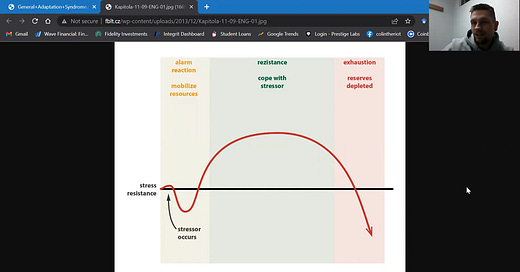Stuck in a plateau? It’s likely for a good reason. General Adaptation Syndrome (GAS) aims to explain the stress response and this model has been used by exercise scientists to describe how we adapt to training. As a trainer at multiple large health clubs I’ve seen tens of thousands of people training in the gym. One common denominator is they love a routine.
They use the same exercises, same machines, same rep ranges. Because it’s comfortable. Routine is the death of progress. When your body has all the answers, it’s time to ask different questions. The common misconception is that by just going into the gym, you’re doing something and that’s “better than nothing”. I detest that mindset. Also, it’s not guaranteed you’re actually doing better than nothing. In fact, you’re likely going backwards by repeatedly doing the same routine week in and week out.
Stages of GAS in Weight Training
Alarm Reaction Stage: The initial phase that begins as a result of putting your body under stress. Training is stress, if it isn’t stressful, you’re doing it wrong. Performance temporarily decreases due to stress and you feel fatigue, soreness, and stiffness from your training within 48 hours.
Adaptation (Resistance) Stage: This stage is self explanatory. It’s when the body begins to adapt to the stress placed upon it. You recover from the stress and begin to see improvements in muscle size, strength, endurance, and other performance qualities.
Exhaustion Stage: This is often referred to as “over training”. Under recovery is a bigger problem than over training for most people but realize exhaustion is possible. If I had you squat for 24 hours straight with no sleep you’d either end up in the hospital with rhabdomyolysis or drop from exhaustion. You’d also be so sore you’d need a wheel chair for days.
Application to Training
Understanding GAS helps in designing effective training programs:
Progressive Overload: Gradually increasing the training load and/or volume allows the body to continually progress.
Periodization: Structuring training into 2-4 week Mesocycles and 8 to 12 week Macrocycles prevents plateaus. It also allows you to steer clear from exhaustion/over training or potential injury.
Recovery: Working out doesn’t grow your muscles and make you stronger. REST DOES. You need to rest to recover. Eat a healthy diet, get good sleep, daily Sunlight, etc. you can find more about lifestyle optimization for recovery and hormone benefits in this article.
Variation: Variation is the spice of life. I recommend rotating exercises every meso cycle (every 2-4 weeks). You can keep your core lifts like bench presses, squats, deadlifts but rotate you accessory movements. Use different angles, cables, dumbbells, barbells, etc to challenge your body through different angles, avoid pattern overload, and drive adaptation.
Now that you’ve read an article you have no reason to plateau. You’re welcome.
Like this article? Give it a share or restack.








Share this post